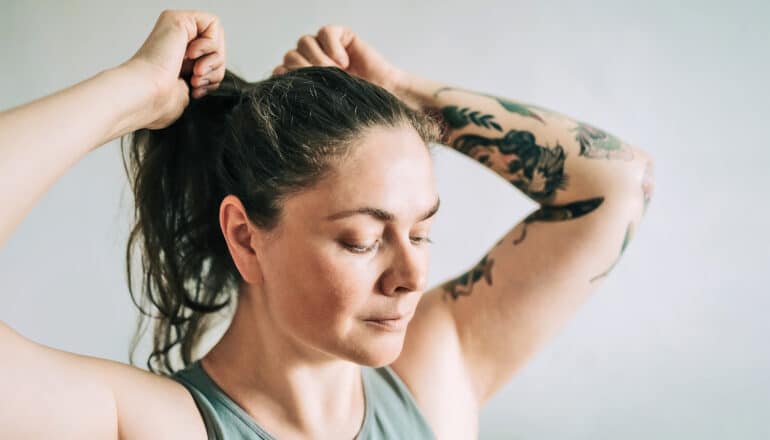People with several tattoos may have less melanoma risk
- A new study found that people with multiple tattoo sessions may have a lower risk of melanoma, but only if they also take good care of their skin and use sun protection.
- The researchers, led by Jennifer Doherty, evaluated 7,000 Utahns and found that having two or more tattoo sessions decreased the risk of both invasive and in situ melanoma.
- However, participants with only one tattoo session were more likely to have melanoma, especially in situ, suggesting that a single tattoo may not be enough to lower the risk.
- The exact reasons for this disparity are unclear, but researchers speculate that multiple tattoos may create a physical barrier or stimulate an immune response against precancerous cells, which could help prevent melanoma.
- More research is needed to understand how tattoos impact skin cancer risk and whether the findings apply to other types of cancer, such as blood cancers. The study’s results are promising for improving prevention strategies in regions with high melanoma rates.

People with more than one tattoo session may have a decreased risk of the skin cancer melanoma—with one key caveat, according to new research.
A team led by Jennifer Doherty, Huntsman Cancer Institute investigator, co-leader of the Cancer Control and Population Sciences Program, and professor of population health sciences at the University of Utah, evaluated 7,000 Utahns and found that having 2 or more tattoo sessions decreased the risk of both invasive and in situ melanoma. In situ melanoma means the cancer cells remain on the skin’s surface and are more easily removed.
But the researchers also found that participants with only one tattoo session were more likely to have melanoma, especially in situ.
The reasons why that may be the case are speculative, and more research is needed to understand this disparate pattern.
“Tattoos are increasingly common, and it’s an understudied form of environmental exposure, especially in young people. We really need to understand how tattoos could impact risk for different types of cancer,” says Doherty.
“For melanoma, the results seem to be mixed. But we see people with two, three, and four tattoo sessions having decreasing risk, and that’s a stronger pattern than the increased risk with just one session.”
According to Pew Research Center, a third of American adults have tattoos. Around 41% of Americans under 30 have at least 1, as do 46% of people between the ages of 30 to 49.
Doherty says that her research team originally hypothesized that having more tattoos would increase melanoma risk due to the carcinogens—like metals and other chemicals—found in tattoo ink. Additionally, the ink in a person’s skin can break down over time and create new carcinogens that weren’t originally in the tattoo. Tattoos can also cause inflammatory responses, and inflammation is often associated with cancer risk.
“The results that tattoos could decrease melanoma risk surprised us. But this isn’t a black and white case of ‘get more tattoos, and you could lower your risk of melanoma,’” says Rachel McCarty, former doctoral student at Huntsman Cancer Institute, current postdoctoral scientist at the International Agency for Research on Cancer, and first author of the study.
“Instead, we need to do more research to understand what we are seeing and if this decreased risk is simply due to behavioral or physical factors, or if there could be beneficial immune responses associated with tattooing which lower melanoma risk.”
It may be that those with several tattoo sessions are more cautious with sun safety and take better care of their skin. Tattoos could also form a physical barrier that blocks ultraviolet radiation or cause an immune response against precancerous cells, the researchers say.
McCarty says those with tattoos should continue making informed decisions about skin protection.
“Tattoo artists already advise their clients to wear sunscreen and sun protection to prevent tattoos from fading,” says McCarty.
“We know wearing sunscreen is an important safety step for everyone, even without tattoos. But it’s also important for those with tattoos to take extra precautions to prevent any additional harmful components from forming in the skin when pigments break down from UV exposure.”
While this study revealed a decreased melanoma risk for those with tattoos, that may not be true for other types of cancer. An earlier project from Doherty’s team and a Swedish study both suggest that tattooing could be connected to an increased risk of certain blood cancers.
Still, the melanoma study is a promising step forward in understanding how tattoos can impact skin cancer risk.
“The Mountain West and the area we serve have some of the highest melanoma rates in the country,” says Douglas Grossman, co-leader of the Melanoma Center at Huntsman Cancer Institute, professor of dermatology at the University of Utah, and coauthor of the paper.
“Better understanding risk factors for melanoma will help us improve prevention strategies across the region, advise our patients about risks more accurately, and ultimately save lives.”
The research appears in the Journal of the National Cancer Institute.
The critical research happening at Huntsman Cancer Institute is supported by the National Institutes of Health/National Cancer Institute as well as Huntsman Cancer Foundation.
Source: University of Utah
The post People with several tattoos may have less melanoma risk appeared first on Futurity.
